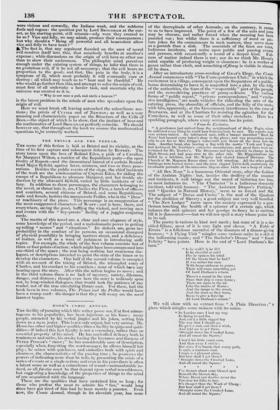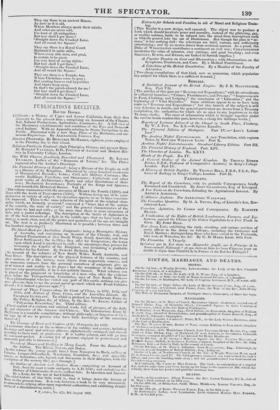HOOD'S COMIC ANNUAL.
THE facility of punning which this writer posse.ses, if at first advan- tageous to his popularity, has been injurious Jo Ids &me ; many people, attracted by his verbal jingles and his jokes, setting him down as a mere jester. This is not only unjust, but very untrue. Mr. Ikon has other and higher qualities than a Ilteility in quips and quid- dales—if indeed this last fiteulty is not a secondary, rather than an essential property of his mind. Ile has unrivalled delicacy both in tenderness and satire, his stroke having the keenness and fineness of PETER PINDAR'S " razor ;" he has considerable ease of description, especially when, forgetting the word-monger, he allows himself fitir play ; he seizes with quickness, and embodies both with spirit and clearness, the characteristics of the passing time ; he possesses the powers of indicating more than he tells, by presenting the crisis of a series of events or a single action; and even in his puns there is often a latent sense as well as a coincidence of sound—untranslatable in- deed, as all live/ice must be that depend upon verbal resemblances, but suggesting a knowledge of the properties of things to the mind of one acquainted with the language.
These are the qualities that have sustained him so long ; for those who profess the most to admire his " fun," would long since have got tired of him had he been merely a punster. Even LOW, the Comic Annual, though in its eleventh year, has none
of the decrepitude of other Annuals ' • on the contrary, it seems to us to have improved. The point of a few of the cuts and jests may be obscure, and rather forced when the meaning has been puzzled out ; but whilst there is a sufficiency of word or pie., ture jokes for the connoisseurs in such matters, they serve more as a garnish than a dish. The essentials of the feast are tales, ludicrous incidents, and satire upon public and passing events and persons, with occasionally a moral of a deeper kind. Feb, ness of matter indeed there is not ; nor do we think Mr. Hoon's mind capable of Producing weight or closeness : he is a worker of gauze rather than cloth, and something offlimsy is visible in almost all he does.
After an introductory cross-reading of GRAY'S Elegy, the Comic Annual commences with " The Correspondence Club ;"- in which the excitement in a village, consequent upon the frequenters of a public. house determining to leave it, is magnified into a plot, by the folly of the authorities, the fears of the " respectable" part of the people, and the news-driving practices of penny-a-liners. The various forms of " public report," " private correspon(lence," and " exclu- sive intelligence," are made vehicles for ridiculing the arts of the catering press, the absurdity of officials, and the folly of the mob; with hits, apparently, at the Government interference in the case of STEPHENS, and at the Chartists for resisting the agitation for the Corn-laws, as well as some of their other crotchets. Here is a sparkling paragraph, where every sentence has its point.
" From the Evelersive.
A gentleman just arrived from the neighbourhood of Stoke Pogis, where he collected every thin,g he could hear from anybody he met. The reports were very serious indeed. An intlituated mot), with a banner inscribed Bred for Ever,' had burned every baker's shop in the place; and was proceeding avow. LW) to set fire to Mrs. Griggss water-mill and throw all the dour into the dam. Another band, also bearing a flag with the motto York and Yages,' had destroyed Mr. Grubbin's extensive manuthetory, and great dears were em tertained for Mr. Trotter's. The Dragoons had been ordered to charge in the High Street, and bad gone over to the other side. Mr. Higginbottom was killed by a brickbat, and Mr. Wigsby had elected himself Dictator. The Church of St. Magnum Bonus alone was left standing. All the other public buildings were burned down ; and the mice elegant Town-hall, containing the invaluable portraits of the successive Mayors since 1450, was a heap of ruins."
" Ali Ben Nous " is a humorous Oriental story, after the fitshion of the Arabian Nights : but, besides the drollery of the manner and incidents, it well brings out the moral of imitating too late, as most imitators do. " The Character" is a ludicrous domestic incident, told with humour. " The Assistant Draper's Petition," and " Queries in Natural History," seem to us forced and flat. The subject of " Doves and Crows" is the zeal of the Quakers for the abolition of Slavery; a good subject not very well handled. " The New Lodger" turns upon the anxiety expressed by a gen- tleman touching the health of a spinster of a certain age, which induces the said spinster and her gossips to fancy he is smitten, till it is discovered—but we will not spoil a story whose point lies in its tail.
The poetry is various in kind and merit ; but none of it is a de- cided failure, most of it is very light and clever.. " A .fable of Errata" is a felicitous narrative of the disasters of a dinner-giving hostess ; " A Flying Visit " mingles some various satire in a skit at the ballooning mania ; and " The Bachelor's Dream " and " Rural Felicity " have points. here is the end of "Lord Durham's Re- turn."
"Is lie well P is he ill?
Is he cheerful or sad?
lies lie spoken his mind Of the breeze that he hail?
It was rather too soon With home-sickness to yearn; There will conic something yet Of Lord Durham's returu.
There's a sound in the wind Since that ship is come Inane; There are signs in the air
Like the OMCI1S of Rome ;
And the lamps in the street, And the stars as they bum, Seem to give a flare-up At Lord Durham's return."
We will close with an extract from " A Plain Direction ; " a piece which mingles some sadness with its satire.
In London once I lost my way lit liiring to and fro,
And ask'd a little ragged boy The way that I should go. De gave a nod, and then a wink, And told ow to get there, ' Straight down t he Crooked Lane, And all round the Square.'
I hox'd his little saucy ears,
And then away I S rude :
But since I've (build, that weary path, Is quite a common road. Utopia i. ii pleasant place, But how shall I get there?
' Straight down the ()rooked Lane, And all round the Square.'
I've dreamt about some blessed spot Beneath the blessed sky,
Where Bread Mt Justice never rise Too dear for folks to buv.
It's cheaper than the Ward of Cheap : But how shall I get there?
'Straight down the Crooked Lane, And all round the Square.'
They say there is an ancient House, As pure as it is old, Where Members always speak their minds, And votes are never sold.
I'm fond of all antiquities:
But how shall I get there ? 'Straight down the Crooked Lane,
And all round the Square.'
They say there is a Royal Court Maintaited in noble state, Where every able man, and good, Is certain to be great.
l'm very fond ot seeing sights : But how shall I get there Straight down the Crooked Lane, And all round the Square.'
They say there is a Temple, too, -Where Christians come to pray ; But canting knaves and hypocrites And bigots keep away. 0, that's the parish-church for me! But how shall I get there ? Straight down the Crooked Lane, And all round the Square.' "



























 Previous page
Previous page